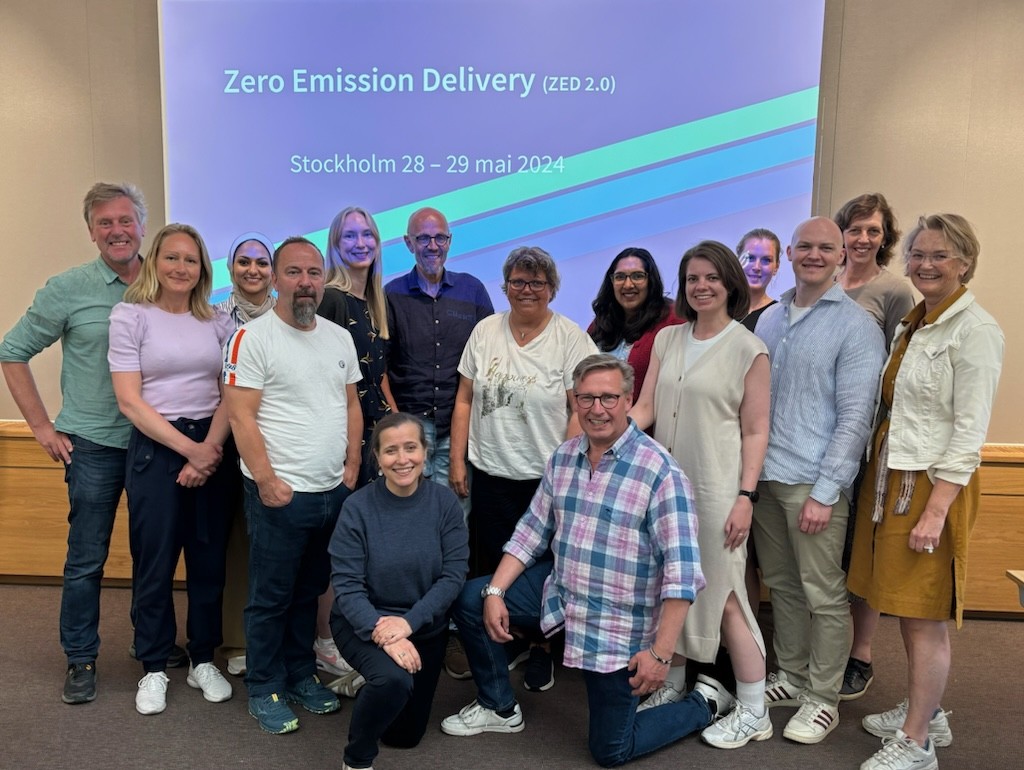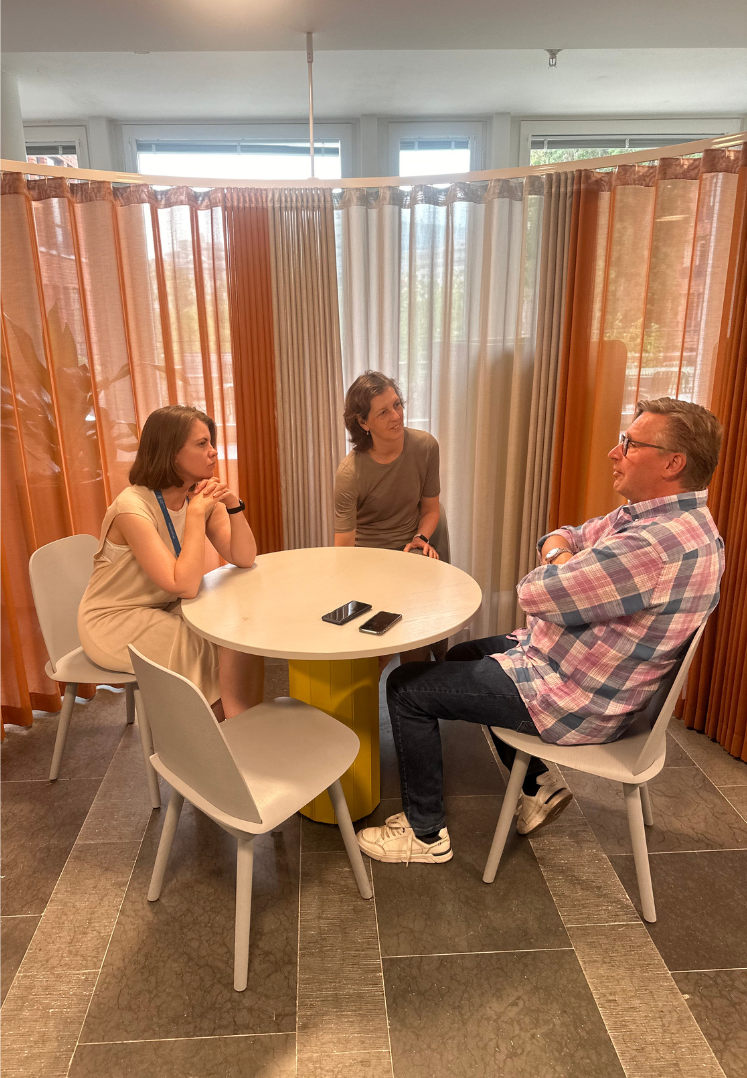In ZED we aim to support Nordic cities reach zero emission delivery and cut public spending, discover greener and more innovative solutions, and enhance public sector collaboration to meet these goals.
Overview
Reducing emissions in delivery services
Public organizations have a substantial opportunity to cut down emissions by adopting zero emission delivery methods. Implementing these changes can be challenging for a single entity, hence, this project serves as a collaborative platform for sharing knowledge and best practices.
Zero Emission Delivery (ZED)
Zero Emission Delivery (ZED) is an important initiative for cities committed to lowering their environmental footprint and promoting sustainable urban logistics. Promoting the use of eco-friendly transportation methods and strategies to handle the delivery of goods in urban areas results in a reduction in greenhouse gas emissions and improved air quality. The ZED initiative is therefore essential for any large city striving to reduce its environmental impact.
Building on the success of ZED 1.0, which ran from 2019 to 2021, this 2.0 version of the project aspires to further advance zero emission delivery in Nordic cities.
ZED 1.0
In the video below, Nordic public procurers share their experiences from ZED 1.0, highlighting successes and lessons learned.
Advancing with ZED 2.0
In this continuation of the project, we have assembled a dedicated network of ambitious public buyers committed to zero emission delivery. This network meets regularly, both online and in person, to exchange experiences, foster innovation, establish common grounds for cooperation, and develop strategies for achieving emission-free delivery services.
Nordic Network on Zero Emission Delivery
Led by the The Supplier Development Programme (LUP), the Nordic Network on Zero Emission Delivery includes the following partners:
- Danmark: The City of Copenhagen
- Norway: The City of Bærum
- Norway: The Supplier Development Programme (LUP)
- Norway: Nav Assistive Technology Centre Agder
- Norway: The City of Oslo
- Norway: The Norwegian Agency for Public and Financial Management (DFØ)
- Norway: The City of Trondheim
- Sweden: Stockholm Municipality
- Finland: City of Kauniainen

Goals
- Increase cooperation and experience exchange across Nordic cities.
- Increase knowledge on how public entities can make the delivery of goods emission-free.
- Facilitate innovative procurements of Zero Emission Delivery of goods.
Our vision is that the Nordic Region will become the most sustainable and integrated region in the world by 2030.
The Nordic Prime Ministers (norden.org)
Latest activities
Zero Emission Delivery (ZED) 2.0 Gathering in Stockholm 28-29 May: A Two-Day Summit of Sharing and Innovation
Overview
The two-day event brought together four Nordic cities and two central government procurement bodies and a global innovation driver to share their experiences and lessons learnt on green public procurement pilot projects.
Projects updates, challenges and successes were presented in collaborative and interactive discussions. Whereby fostering knowledge sharing and green innovation in logistics in the public sectors across the Nordics.
Hosted by The City of Stockholm, the group gathered at the Tekniska nämndshuset and discussions were moderated by the Leverandørerutviklingsprogram (LUP). The gathering fulfills a primay goal of the project: to increase cooperation and experience exchange accross Nordic cities.
In the Nordic Region, we have shown time after time that we are stronger together.
The Nordic Prime Ministers
Participants
- The City of Stockholm Environmental Administration, Stockholms stad miljöförvaltningen, with Älskade and Menigo as service delivery partners
- NAV Assistive Technology Centre in Agder, NAV Hjelpemiddelsentral i Agder
- Bærum Municipality
- The Municipality of Oslo Development and Skills Agency, Utviklings- og kompetanseetaten i Oslo (UKE)
- The National Agency for Public Procurement, Upphandlingsmyndigheten
- The Suppliers Development Program, Leverandørutviklingsprogrammet (LUP)
- The Norwegian Agency for Public and Financial Management, Direktoratet for forvaltning og økonomistyring (DFØ)
Agenda highlights
- Experience Sharing by Bærum Municipality focusing on their analysis tool for sustainable delivery.
- Brainstorming Session where the group discussed how the project experiences can benefit cities and municipalities outside of the ZED 2.0 project. Facilitated by LUP, the session explored ideas such as websites, media coverage, webinars, online sharing, meetings, and more.
- Experience Sharing by The City of Stockholm on Off Peak Delivery project where logistics partners Menigo presented strategies and successes with off-peak delivery solutions.
- Team Building activities to strengthen collaboration as a diverse Nordic group.


Appendix
Past activities
Highlights from May 2022 to May 2024
31 May–1 June 2022: Kick-off meeting in Copenhagen
1–2 June 2023: Workshop in Stockholm
14–15 December 2023: Workshop in Helsinki
28–29 May 2024: Workshop in Stockholm
14–15 November 2024: Workshop in Oslo
5 June 2025: Workshop in Oslo and planning of next project period, ZED 3.0
Innovative projects
NAV Assistive Technology Centre Agder has undertaken significant measures to enhance the sustainability of its transport and logistics operations. By focusing on groupage and efficient coordination, the Centre aims to better utilise available transport capacity, thereby reducing emissions and operational costs.
Bærum, Oslo, and Drammen are addressing transport challenges by improving data integration and reducing manual processes. Their collaboration aims to implement efficient, sustainable strategies to cut emissions, showcasing the power of cross-sector cooperation for a greener future.
In an effort to improve urban logistics and sustainability, the City of Stockholm has partnered with Menigo Foodservice AB to pilot off-peak delivery of food supplies to schools, preschools, and care homes. This initiative, set for Q1 and Q2 of 2024, aims to test and verify the feasibility and benefits of scheduling deliveries outside traditional hours.
You can read more on these projects in Norwegian on Leverandørutviklingsprogrammet's (LUP) website: Utslippsfri varelevering: Tre nordiske prosjekter viser vei - Innovative anskaffelser
